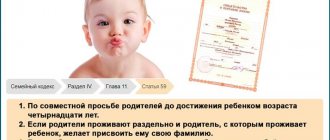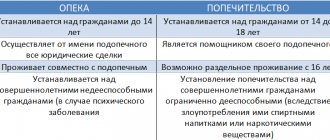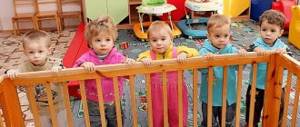In the Family Code of the Russian Federation, chapter number 20 is devoted to the topic of maintenance and guardianship of children.
Guardianship (trusteeship) is mentioned quite often in the legal literature and this concept can be characterized as a type of welfare for children left without parents, and guardianship is also a legal form of protecting the rights and freedoms of children.
In family law, the regulation of guardianship and trusteeship is a key goal only in relation to the welfare of children left without parental supervision. Guardianship issues also include the norms of civil procedure and the institution of family. The goals of child custody are prescribed in Article 145 of the RF IC and read as follows:
- Upbringing and training, obtaining an education, guaranteeing the protection of the rights and freedoms of children;
- Security and freedom of speech, the right to personal opinion.
Who cannot obtain guardianship of a child?
Based on article number 146 of the RF IC, guardians cannot be those persons who:
- do not have parental rights;
- sick with serious illnesses, associated with drug and alcohol addiction;
- suspended from exercising guardianship rights;
- former guardians and adoptive parents whose rights to guardianship were rejected by the court;
- limited parental rights.
According to Article 146 of the RF IC, only persons who have reached the age of majority can be guardians of children.
Article 148.1. Rights and obligations of a child's guardian or trustee
1. The rights and obligations of a child’s guardian or trustee arise in accordance with the Federal Law “On Guardianship and Trusteeship”.
2. Unless otherwise established by federal law, the child’s parents or persons replacing them lose their rights and obligations to represent and protect the rights and legitimate interests of the child from the moment the rights and obligations of the guardian or trustee arise.
3. Any actions (inaction) to exercise guardianship or trusteeship by a guardian or trustee of a child may be appealed by the parents or other relatives or adoptive parents of the child to the guardianship and trusteeship authority.
The guardianship and trusteeship authority has the right to oblige the guardian or trustee to eliminate violations of the rights and legitimate interests of the child or his parents or other relatives or adoptive parents. If the guardian or trustee does not obey the decision of the guardianship and trusteeship authority, the parents or other relatives or adoptive parents of the child have the right to apply to the court with a demand to protect the rights and legitimate interests of the child and (or) their rights and legitimate interests. The court resolves the dispute based on the interests of the child and taking into account his opinion. Failure to comply with a court decision is grounds for removing a guardian or trustee from performing their duties.
4. A guardian or trustee has the right to demand, on the basis of a court decision, the return of a child under guardianship or trusteeship from any persons holding the child without legal grounds, including from parents or other relatives or adoptive parents of the child.
5. A guardian or trustee does not have the right to prevent a child from communicating with his parents and other relatives, unless such communication is not in the interests of the child.
6. A guardian or trustee of a child has the right and obligation to raise a child under their guardianship or trusteeship, to take care of the health, physical, mental, spiritual and moral development of the child.
A guardian or trustee has the right to independently determine the ways of raising a child under guardianship or trusteeship, taking into account the opinion of the child and the recommendations of the guardianship and trusteeship body, as well as in compliance with the requirements provided for in paragraph 1 of Article 65 of this Code.
The guardian or trustee has the right to choose an educational organization, the form of education the child receives and the form of his education, taking into account the opinion of the child before he receives basic general education and is obliged to ensure that the child receives general education.
7. The property rights and obligations of a guardian or trustee are determined by civil legislation, as well as the Federal Law “On Guardianship and Trusteeship”.
8. Supervision over the activities of guardians or trustees of minor citizens is carried out in accordance with the Federal Law “On Guardianship and Trusteeship”.
Rights and responsibilities of trustees when registering guardianship
Article 148 of the RF IC clearly states the rights of children under guardianship.
Children who are under guardianship have the right to:
- Education and care from adoptive parents, living with their guardians, receiving education and development;
- To receive alimony and social payments;
- Preservation of the right to housing received in accordance with civil law;
- The right to receive maintenance and money from the state budget, paid every month in the amount established by the constituent entities of the Russian Federation.
Rights of guardians and trustees
Guardians are primarily obliged to protect their child and guarantee the protection of the child’s physical and psychological health. Taking into account the child’s opinion and choice is very important; the guardian must listen to his ward and give a free choice to choose an educational institution and the learning process.
At the same time, based on the decree of the family institution, guardians are required to live together with their wards. The issue of separation is resolved on an individual basis in court proceedings, if this does not affect the psychological health of the child.
Guardianship and trusteeship of minor children
Concept, goals and authorities of guardianship and trusteeship
Guardianship and trusteeship of minor children left without parental care is one of the legal forms of protecting their personal and property rights and interests, as well as ensuring their maintenance, upbringing and education.
Guardianship is established over children under 14 years of age. Guardianship - over minor children aged 14 to 18 years.
The purposes of guardianship and trusteeship of children left without parental care are defined in paragraph 1 of Art. 145 of the RF IC, this is:
- maintenance, upbringing and education of children;
- protection of their rights and interests.
The guardianship and trusteeship authorities are local government bodies: district, city, city district administration at the place of residence of the minor or at the place of residence of the guardian (trustee).
Guardians and trustees of children (Article 146 of the RF IC)
Adults with legal capacity may be appointed as guardians and trustees, taking into account their personal qualities, abilities to perform the duties assigned to them, the relationship between the child and the guardian (trustee) and the attitude of the guardian's (trustee's) family members towards the child.
Whenever possible, the wishes of the child are taken into account when appointing guardians and trustees.
Guardians and trustees can be appointed only with their consent. Consent is expressed in a statement to the guardianship and trusteeship authorities.
A guardian (trustee) is appointed within a month from the moment when the guardianship and trusteeship authorities became aware that the child was left without parental care, by a resolution of the head of the local administration at the place of residence of the ward or guardian (trustee).
If a guardian (trustee) is not appointed within a month, the guardianship and trusteeship authorities will temporarily assume their duties.
The law defines the circle of persons who cannot be guardians and trustees (Article 146 of the RF IC):
- persons deprived of parental rights;
- persons with chronic alcoholism or drug addiction;
- persons suspended from performing the duties of guardians and trustees;
- persons with limited parental rights;
- former adoptive parents, if the adoption was canceled due to their fault;
- persons who, due to health reasons, are unable to carry out the responsibilities of raising a child.
For children under full state care in educational, medical institutions, social welfare institutions and other similar institutions, guardians and trustees are not appointed; their functions are performed by the administration of the relevant institution.
Rights of children under guardianship (trusteeship) (Article 148 of the RF IC).
The rights of children under guardianship (trusteeship), like any minor children, are divided into personal and property rights. Personal rights include:
- the right to be raised in the family of a guardian (trustee);
- the right to care from a guardian (trustee);
- the right to live together with a guardian (trustee). When the ward reaches 16 years of age, the guardianship and trusteeship authorities may allow separation if this does not adversely affect the education and protection of the rights and interests of the ward;
- the right to ensure conditions for maintenance, upbringing, education, comprehensive development and respect for human dignity. At the same time, the guardian (trustee) is not obliged to support the ward at his own expense, he only ensures the conditions of maintenance at the expense of the funds due to the ward;
- the right to communicate with parents and other relatives, if the parents are not deprived of parental rights. When parental rights are limited, guardians (trustees) have the right to prevent communication between parents and the child if such communication is contrary to the interests of the child;
- the right to express his opinion when resolving any issue affecting his interests;
- the right to protection from abuse by a guardian (trustee).
The property rights of children under guardianship (trusteeship) include:
- the right to alimony, pensions, benefits and other social benefits due to them;
- preservation of ownership of residential premises or the right to use residential premises;
- the right to receive residential premises out of turn at the end of their stay with guardians (trustees), if previously the ward did not have residential premises under the right of ownership or use;
- ownership of income received by the ward; on property received as a gift or by inheritance; for any other property acquired with the child’s funds;
- the right to dispose of property owned by a child in accordance with Art. 26 and 28 of the Civil Code of the Russian Federation.
Rights and responsibilities of a guardian (trustee)
The personal rights and responsibilities of guardians and trustees provided for by the RF IC essentially coincide with the rights and responsibilities of parents in relation to their minor children.
In addition, a number of rights and obligations of guardians and trustees are provided for in Art. 36-38 Civil Code of the Russian Federation:
- guardians and trustees of minors are required to live together with them (separate living is possible only with the permission of the guardianship and trusteeship authority when the ward reaches 16 years of age);
- guardians and trustees are obliged to notify the guardianship and trusteeship authorities of a change of place of residence;
- guardians (trustees) can spend the income of the ward only with the consent of the guardianship and trusteeship authorities, with the exception of funds necessary for the maintenance of the ward;
- without the prior consent of the guardianship and trusteeship authorities, guardians do not have the right to make, and trustees do not have the right to consent to, transactions with the property of the ward if they entail a decrease or deterioration of this property;
- guardians (trustees), their spouses and close relatives do not have the right to enter into transactions with their wards, with the exception of transferring property to the ward as a gift or for free use.
Guardians and trustees do not have property rights in relation to the property of the ward and the right to use residential premises owned or used by the ward, and they do not have obligations to maintain the ward at their own expense.
Responsibilities for guardianship and trusteeship are performed free of charge.
Termination of guardianship and trusteeship
Termination of guardianship and trusteeship is possible on three grounds:
- when the ward reaches a certain age: guardianship ends when the child reaches 14 years of age, and it automatically becomes guardianship. Guardianship terminates upon reaching the age of majority or upon attaining full legal capacity before the age of 18.
- upon release from the duties of a guardian or trustee. This is possible when the child is returned to the parents; upon adoption or placement in an educational, medical institution, social welfare institution and other similar institutions; at the personal request of the guardian (trustee) if there are good reasons;
- when a guardian (trustee) is removed from performing duties. This is possible if the guardian (trustee) performs his duties improperly, uses guardianship (trusteeship) for personal gain, and leaves the ward without supervision and necessary assistance.
The release and removal of guardians and trustees from their duties is carried out on the basis of a resolution of the head of the local administration.







